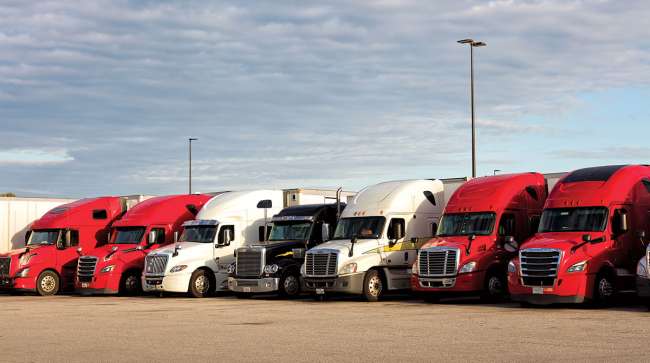The average retail sale price for a used Class 8 truck in February dropped 13.1% year over year to $53,882 from $62,004. (Bim/Getty Images)
Used Class 8 truck sales declined year over year in February with market uncertainty making it difficult to predict whether to invest in equipment, ACT Research reported.
Sales volume slipped 0.9% to 21,500 units from 21,700 reported in the prior-year period. It also fell 8.9% sequentially from 23,600 units in January. The average retail sale price dropped 13.1% year over year to $53,882 from $62,004 while declining 6.2% sequentially from $57,454. Average mileage increased 1.7% to 426,000 from 419,000 a year ago and 2.7% from the 415,000 reported the previous month.
“To say the underlying fundamentals that drive used truck demand and pricing are in a state of flux right now would be a significant understatement,” ACT Research Vice President Steve Tam said. “Starting with on-again, off-again tariffs, business owners, including truckers, are finding it particularly challenging to make decisions, including purchasing trucks. As demand falls, so will used truck valuations.”
ACT Research concluded in its report that demand and pricing are in a state of flux. The average retail sales price fell by its largest percentage sequentially since June 2024. Tam pointed out that this is following January, which is typically the fourth-weakest sales month of the year.

Tam
“I have seen an increase in prices on your 2019s and better, especially with the lower miles,” said Charles Smith, regional business development and marketing manager at Mission Financial Services. “There has been a slight increase on those. Of course, the ’18s and below, with a little bit more miles on them, are still relatively affordable. You can get them for little or nothing as of right now. But with that being said, the market for us, and even the trucking industry as a whole, it’s kind of in limbo.”
Smith noted that the year started slowly but picked up in February. He has heard from many customers that they are waiting for clarity in what direction the industry is taking before investing in equipment.

Smith
“Of course, with the government, the tariffs, you have your seasoned drivers and seasoned truck company owners that don’t know which way to turn as of right now,” Smith said. “A lot of them don’t want to get bogged down with units that they’re not going to be able to fill because you don’t have the products to transport. It is a volatile situation right now.”
Smith has heard from both franchise and independent dealers that many of their customers are hesitant. He also understands that attitude as it can be difficult for a carrier to know whether a new truck will be needed or affordable given the economic uncertainty.
“You don’t want to get yourself in a situation you can’t get out, and we don’t have a crystal ball to predict what’s going to happen,” Smith said. “As a consumer, the best thing to do is kind of wait it out, as long as you can, to see how things are going to be, if things are going to turn for the better or for the worse.”






